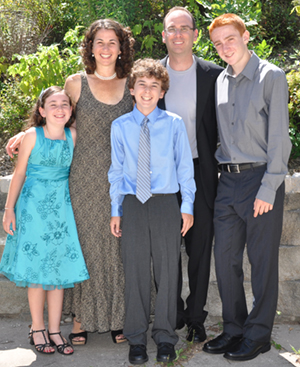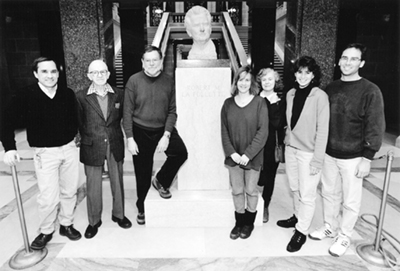
FFRF has awarded Mayan and Balen Essak each $1,000 student activist awards. Freethought activism runs in the family (see sidebar).
For several years, our Wisconsin public high school’s football team has partnered with a private, Catholic high school to create a competitive team. For years, the team’s logo was a simple MS, combining our schools’ first initials.
Last year, our graphic arts program assigned students a project to create a new logo, combining our high school’s logo, a greyhound, with the private school’s logo, a Catholic bishop’s hat with a cross on it. The winning design would replace the old logo. After passing through the football coach, principal and many other school authorities, a design that cleverly combined the logos was chosen and printed on decals for helmets.
For most of the season, the cross-bearing helmets went unbeknownst to us until the school newspaper printed an article about them with a few weeks left in the season. Publication of the situation prompted an immediate response.
The day the paper came out, one of us, along with some other upset peers, brought it to the assistant principal’s attention that we were unhappy with a religious symbol representing our football team and public school. We felt that it was unfair to force people to wear a cross on their heads if they wanted to play football. It was a clear issue of separating church and state.
We brought it to the attention of our parents as well, who, that night, emailed the school board and principal explaining that without swift action, we would be contacting the Freedom From Religion Foundation.
At the school board meeting that one of us attended, the board acknowledged our request. They all had been unaware of the new logo and voted unanimously and with minimal discussion to remove the decals as quickly as possible.
Taking responsibility for the mistake, the principal apologized and had the decals removed before the next game. Unfortunately, many people were unhappy with the decision. One school board member received many emails and phone calls from disapproving citizens across the nation, but there were many local protesters, too.
We had to explain countless times to oblivious peers why having a cross on a public school’s football helmet isn’t acceptable. Many felt that since a private school was involved, they should be allowed to have their symbol represented on the team’s logo.
They couldn’t understand that when a private school partners with a public school, they need to follow the public school’s rules. Students at the private school may have signed up to be represented by a cross, but anyone attending a public school can expect complete freedom from religion in all representations of their school and all school-sponsored activities.
Another common complaint was that since we weren’t football players, and because we weren’t actually wearing the cross, we weren’t directly affected by the logo and shouldn’t care or make such a big deal about it.
On the contrary, it did directly affect us. At every single football game our team had played so far this season, people saw our football team associated with Christianity. People seeing our school as a Christianity-endorsing institution doesn’t just affect the football players. It affects anyone associated with our school district.
Just because we’re not football players doesn’t change the morality of the situation. In the theoretical but entirely possible situation that we wanted to play football, we should not be forced to wear a cross on our heads. The helmet logo was morally and legally wrong; whether or not we play football doesn’t change that.
Some other arguments were even more outlandish. This was one of the emails a school board member received: “Everyone wonders why America is in decline. The answer is simple, our country was founded with Christian values . . . and every time we disavow his image or the cross we are a little less blessed each day. . . . I don’t know what your religious affiliation is, but if you are a Christian . . . think about putting God ahead of your job and political motivations. . . If they don’t like it, tell them to go to another school . . . If you are a liberal, you won’t understand me.”
Obviously, America was not founded on Christian values but on moral principles, which contradict this point of view. Another email received in response to the decision stated, “This has nothing whatsoever to do with separation of church and state and you know it. What it shows is that today’s society is determined to shield this generation from Christianity and remove all mention of God from our lives. Our great country was founded on the belief of personal and religious freedoms and you have now done your part to squash that freedom.”
Actually, it did have to do with separation of church and state. Also, not forcing Christianity upon others seems more like freedom from religion than the freedom suggested in this email.
To us, this issue seems absolutely self-evident. By separation of church and state, it is unacceptable to place any religious symbols on a public school’s uniforms. How so many people are naïve about this idea is bewildering to us. Working to remove the cross from our school’s helmets was a rewarding experience, but also an eye-opening one.
Sadly, far more people than we had ever imagined are completely oblivious to religious symbols in public settings and are too ignorant to other points of view to understand why the cross had to be removed. Hopefully, this has been a learning experience for all.
We just hope that if a situation like this arises, and we aren’t there to fight for our freedom from religion, someone else will.

Jennifer and Sam Essak (at right), parents of Mayan and Balen, as state employees were among the victorious plaintiffs in FFRF’s lawsuit declaring unconstitutional Wisconsin’s Good Friday holiday in 1996. “We’re thrilled to see two generations of commitment to the First Amendment in the Essak family,” said FFRF Co-President Annie Laurie Gaylor. Also pictured by the Robert La Follette bust in the Wisconsin Capitol in 1996 were Good Friday plaintiffs (left) Dan Barker, Michael Hakeem, Richard Uttke and Annie Laurie and Anne Gaylor.

